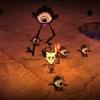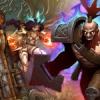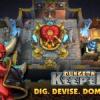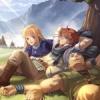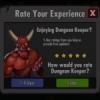If you were asked to think of a fantasy RPG that was crushingly difficult, mechanically complex, obsessed with character statistics and utterly merciless when it comes to punishing the slightest mistake, then the chances are you’d immediately name Demon’s Souls or Dark Souls. And you’d be right of course - those two games, with a third due to arrive in March of next year, have gained a justified reputation for all of the above. How many other games would celebrate their difficulty with such pride that they ask you to “Prepare To Die” before you have even slipped the disc into your machine?
But what if I told you that there was another game, predating those two by over twenty years which makes them look positively lenient in comparison? You might balk at the idea, but such a game exists.
Welcome to Angband, a game so sadistic that after two decades there are still players who have yet to conquer it; a game that can bring you out in a cold sweat simply by displaying a capital D on the screen.
Created in 1990 by Andy Astrand and Alex Custer during their time at the University of Warwick, Angband belongs to the Rogue-like genre of games; a sub-genre of the RPG named after the game that spawned it, these games are best known for random generation, permanent death and presenting their worlds purely in ASCII characters. Oh – and for being very, very difficult.
The goal of the game is simplicity itself - descend to level 100 of the dungeon and slay the monster Morgoth. That’s it. There are no side quests requiring you to fetch 8 sacred pieces of some long-forgotten amulet, no relationships with other characters to be developed, no party to manage and no tracking of morality. There’s just your character, a town screen and 100 randomly-generated dungeon levels filled with loot, traps and monsters.
Beyond that, it’s fairly standard RPG fare - if a game this devious can ever said to be standard. You create a character, choosing gender, race (11 in total, each with their own unique racial traits, starting stats and attribute modifiers), and class. You can then choose to whether to let the game auto-roll your final attribute scores or to allocate them yourself using a basic points-based system. Finally all that’s left to do is choose a name for your hero and off you go.
Boot it up for the first time and you might scoff at how laughably primitive Angband looks. After all, it’s a game that makes the humble ZX Spectrum look like a graphical powerhouse. Modern versions of the game (even after all this time it is still receiving updates, though Astrand and Custer have long since moved on from the project) have a selection of tilesets to choose from but in my opinion they actually detract from the atmosphere. If you want the “pure” Angband experience, then you’ll turn the tilesets off and play the game in all of its original ASCII glory.
The reason for doing this is simple: this is a game that rewards imagination. Having those tiles representing everything is all well and good, but it’s best, in my opinion, to simply let your mind fill in the blanks. A small 8×8 tile of a mass of white worms will never be as horrific as what your mind can conjure up. It may just be a “w” on the screen, but in your imagination that innocent letter of the alphabet will be transformed into some disgusting, writhing mass covered in ichor and beady black eyes. There may be no sound coming out of your speakers but you’ll swear you can hear every time your foot falls on dank stone and the fluttering of your torch’s flame in the darkness. Playing Angband is like a trip back in time to when the power of imagination was far greater than what a computer was capable of rendering on screen. The irony is that it actually feels more real because of it.
After getting over the shock of the visuals, the next challenge in front of you is learning how to actually play. Everything you do in the game is performed via keyboard presses and selecting options in menus. Again, this might all sound basic, but Angband is as ruthlessly challenging and mechanically deep as any game you care to mention. Your first clue to how complex this game is will come with your first look at the command list.
The game utilizes 93 basic command inputs, so many that it differentiates between lower and upper case keystrokes. For a large number of those commands, tapping the key will simply open a sub-menu with a further list of options, which will then take you to yet another menu. If you’re first starting out in Angband, you’d do well to ensure you have a separate window open to keep track of what every button does (and thankfully there are a number of excellent starter guides available online).
While a few those commands are for system functions like saving and quitting the game, the vast majority will need to be used if you’re to have any hope of descending to the 100th level of the dungeon and slaying the vile Morgoth. Corridors need to be searched for hidden passages, mineral veins and collapsed rubble needs to mined and tunneled, potions need to be quaffed and traps need to be disarmed (assuming you spot them before it’s too late). There are separate keys for praying, casting magic, learning magic, wearing and taking off armor, throwing items, aiming wands etc. The list is mind-boggling.
If you’re worried about whether or not you’ll be able to remember all of those commands in the heat of the moment as you desperately try to escape from whatever alphabetical horror is chasing you down a darkened corridor, then don’t be - the one blessed concession granted by the game is that it’s entirely turn-based. The world won’t act unless you act first, so no matter how desperate things may seem you can take all the time in the world to consider your next move. That zombie might be mere inches away from sinking its teeth into your neck, but it’s still polite enough to wait patiently for you to respond.
Not that it will make a huge amount of difference, mind. As I said before, the game is tough. At least in Dark Souls, if you die you respawn at the last campfire you rested at, your inventory and skills intact. Angband has no such respect for you. If you die, the game promptly deletes your save and presents you with a crude depiction of a gravestone complete with your character’s name, level, how deep into the dungeon they were and how they died. Get used to that screen - you’ll be seeing it a lot. And your deaths won’t be noble; a sticky end awaits around every corner and is never more than a moment away. You’ll die of starvation (characters need to eat in the game, every action gradually sapping their energy reserves), you’ll die after being ambushed by monsters while resting (there are no safe areas here), or by casting a spell only to have it backfire and disintegrate you.
The loot you pick up frequently needs to be identified, but the scrolls required to do so are expensive. If you’re a Wizard and sufficiently high-level then you might have learned how to identify items magically, but casting the spell carries a high mana cost and you never know if there might be a monster just around the corner waiting to take advantage. Of course, you could identify an item by using it, but doing so is risky. That shiny new sword could be cursed, that potion could be poisonous, and that scroll could summon a swarm of monsters from the darkest depths of the dungeon to surround you. Even the loot has it in for you.
Even in town you’re not safe - urchins will sneak up behind you and steal your items, a mercenary might mow you down simply for getting too close and even the village idiot will follow you around trying to drool on you.
And when you descend the stairs back into the dungeon after a trip to the shops? The dungeon is generated all over again, the passages down so convoluted that it’s impossible to ever return from whence you came (unless you were lucky enough to have used a scroll of Recall to return above-ground).
Make no mistake, this game hates you with a passion.
But by God, it’s satisfying. After your first, brief, humiliating trips into the darkness below the town, you’ll learn to take it slow. Your first attempts at the game are unlikely to last more than an hour if you’re very, very lucky. But gradually you’ll learn to stock up on rations and torches (yes, you always need to ensure you have a light source in order to see the world around you) and you’ll realize that often the best way to progress is to retreat; the best way to survive a fight is to never start it in the first place. Slamming a door shut and running away isn’t cowardly - it’s downright essential and until you learn that you haven’t got a hope of even descending to the 5th level, let alone the 100th. Learn those lessons though and the game transforms into one of the most tense, rewarding and satisfying games you’ll ever play. There’s not many games that can make you let out a genuine sigh of relief simply for surviving after drinking from a bottle.
It’s this sense of incremental progress that will have you coming back again and again and again. You’ll die, you’ll curse and you’ll bang your head against the back of the chair. But then you’ll go right back and create a new character because this time you might get a little deeper down, or achieve that next character level. You’ll make daring hit-and-runs on levels deeper than you have any right of being in, simply to try and get some more valuable loot, before escaping back up to a higher level either with a shiny prize or a slither of remaining health. The game is punishing, but the fine balance between risk and reward means that it never feels unfair – every mistake is your mistake, every failure your own. Victory is certainly slim, but it never feels unattainable.
Few people have ever reached Morgoth. Fewer still have defeated him. I’ve never managed to get further than the 23rd level, after more than a decade of playing and the official forums are filled with similar tales of woe – people who managed to make a character survive for months before late-night exhaustion caused them to make a stupid move or one gamble too many finally saw the game exact its revenge.
But even now, twenty years later, those players yet to conquer the deepest levels of the dungeon are still staring at that gravestone, still rolling new characters, and still breaking out in a sweat when they see the letter D coming down a corridor created by hash symbols.
Angband is Open-Source and available to download for MacOS, Windows and Android at www.rephial.org. You can also download the source code from the same site.

